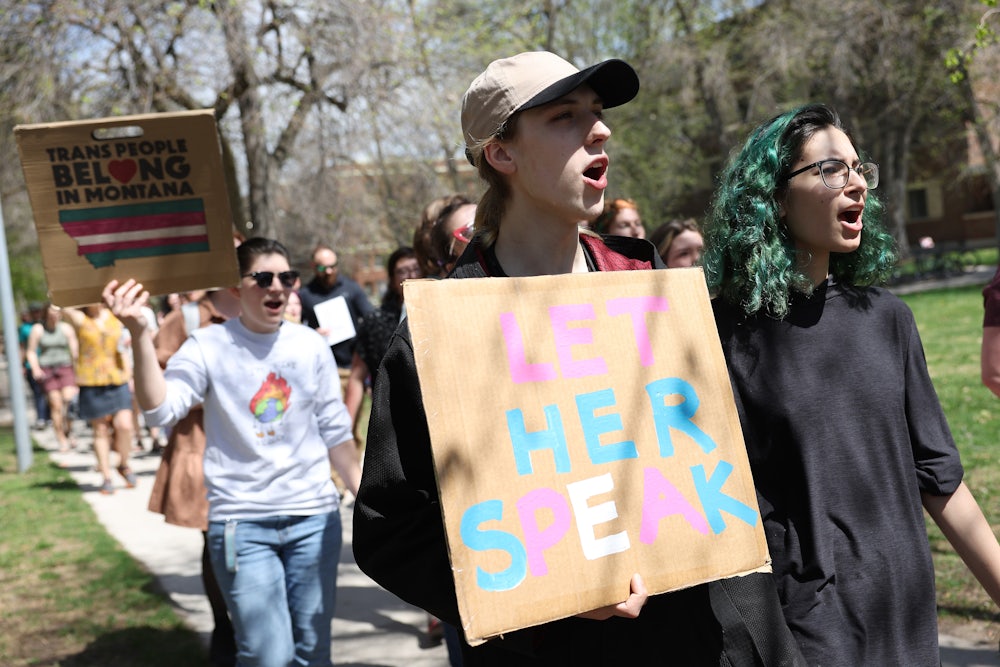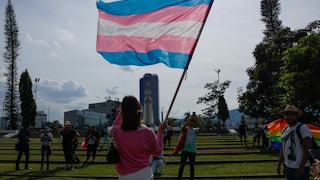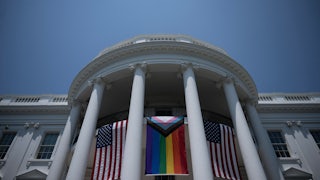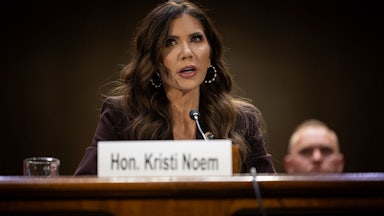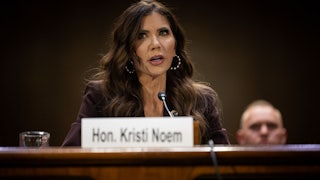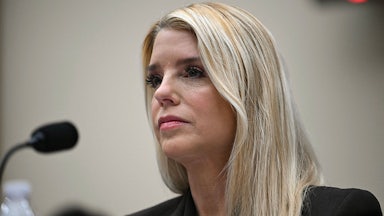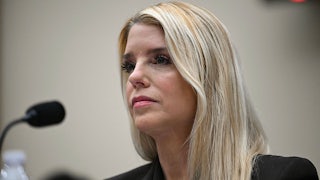Only a few years ago, one of the biggest talking points by the right, the radical centrists, and a few “pick-me” progressives was the backlash against “cancel culture” and the threat to freedom of speech and expression it supposedly represented. The open letter published by Harper’s was one of the most splashy forays into this particular front in the culture war, but it has continued to feature prominently in places like the New York Times editorial page.
The fear and outrage surrounding cancel culture came mostly from the right, and for good reason: It was led by people who wanted a right (and a right to a platform) to verbally abuse transgender people specifically. J.K. Rowling was one of the biggest defenders of Maya Forstater’s “freedom of speech,” which a judge found created a “hostile, degrading, humiliating or offensive environment” for transgender people.
When they experienced pushback for their views (including their calls for the government to eradicate transgenderism and reduce the number of transgender individuals to the minimum possible), they proceeded to scream that their freedom of speech was being infringed upon, like a footie player looking for a yellow card.
Some, like Rowling, even claimed that they would absolutely come to the defense of trans people if their rights were ever infringed upon. “Dress however you like,” she tweeted. “I respect every trans person’s right to live any way that feels authentic and comfortable to them. I’d march with you if you were discriminated against on the basis of being trans.” Every signatory to the Harper’s letter did so implicitly as well: Freedom of speech and expression is for everyone, and governmental suppression thereof is a step further than simple cultural pressure against speech considered to be hateful or harmful.
Rowling tweeted as if the threat were hypothetical. The problem is, it’s all too real. The most clear-cut example of this suppression is happening in Montana, where a drag ban was passed this year. Like most of this crop of drag bans, the Montana law was so broad and overly vague that the Dallas Symphony Orchestra could be considered “obscene” if its third clarinet player was transgender. Despite assurances from Montana Republicans that their drag ban had nothing to do with transgender people, the first application of the law was to ban a transgender person from speaking at a public library, based on the legal advice of county attorneys.
The event was not drag. It was a presentation on the history of trans and two-spirit people being given as part of Pride month. The speaker, Adria Jawort, was not presenting obscene material. She was not dressing or acting in a way meant to titillate. She was going to give a history lesson in a public library, and the government effectively said, “No, it is illegal for that person to do so because they are trans and dressing in a manner consistent with their gender identity, even if the way they dress is legal for other individuals.”
In other words, if a cisgender (non-transgender) person presented that same material, it would be legal. But for a transgender person to present it, they would have to detransition (i.e., erase themselves). When the government tells a class of people that they cannot speak in public and cannot express themselves in a way that everyone else can (with clothing that is perfectly acceptable in public for everyone else), this is a clear violation of the First Amendment. And yet there’s nary a peep from the people who promised to march with trans people or defend freedom of speech to the death, because they cared first and foremost about ensuring that they retained their own commercial platforms, while painting trans people as the villains.
On a broader level, the propagation of “Don’t Say Gay” laws has led to the government deputizing right-wing busybodies to challenge and eliminate any reference to LGBT people in schools. We’ve all seen the empty shelves in Florida and the teacher who is under investigation by the Florida Department of Education because she showed her class a P.G.-rated Disney movie. Never mind that every student in the class had received permission from their parents and it was connected to the curriculum: It showed a gay character, and that was enough.
This is a national problem. The Missouri state attorney general has promised to defund any public library that has LGBT-related material. Books are being banned from libraries at an unheard-of rate, and 43 percent are being removed because they have LGBT themes or characters.
When it comes to trans people, the right seemingly wants to go even further to curtail their constitutional rights. Presidential candidate Nikki Haley has been campaigning on the idea that transgender people are why teen girls attempt suicide. This is patent nonsense, of course: Teen suicide rates are lowest in states where trans people are protected by law and highest in the state (Idaho) that has led the charge to ban them from sports and locker rooms. Haley, however, singles out comedian and TikTok influencer Dylan Mulvaney in particular as a cause of teen girls contemplating suicide.
“Make no mistake. That is a guy, dressed up like a girl, making fun of women. Women don’t act like that. Yet everybody’s wondering why a third of our teenage girls seriously contemplated suicide last year?” Haley said of the TikTok celebrity. Most of Mulvaney’s videos are fluff—a video diary along with makeup, hair, and skin care tips: stuff that any cisgender social media influencer would have no trouble posting. But the implication by Haley is clear: Transgender people, and content, must be removed from anywhere that might be seen by people under 18, even if the content itself is innocuous.
Pause for a moment to consider: This is a serious GOP candidate for president strongly implying that the government should ensure that a class of people are denied access to social media and forbidden from putting content featuring themselves on the internet. It is hard not to draw comparisons to Germany’s banning Jews from writing for newspapers in 1933, then banning them from stage and screen in 1934.
So here we are today, with books featuring LGBT people being banned across the country, trans people literally banned from speaking in public by the government due to anti-drag laws, and presidential candidates implying trans people should be banned from social media. And yet there hasn’t been a peep from any of the supposed free speech crusaders. Not Singal, Rowling, Herzog, Weiss, Pinker, Frum, or Yglesias. Mass market national media, which gladly picked up on the message that transgender people were a threat to fundamental human rights, is now silent as conservatives are using the full force of government to eradicate trans people from public life and eliminate reference to them in anything but a negative light.
